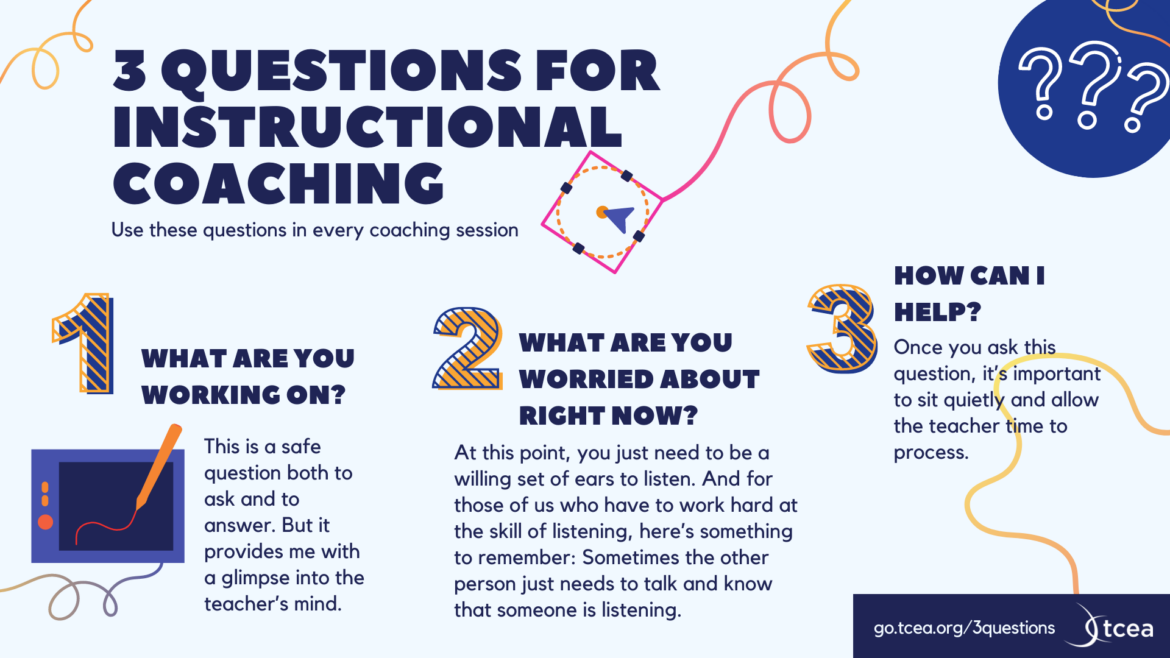Working with educators to improve teaching and learning is an amazing job. It’s full of promise and friendship and possibilities. But it can also be tiring and frustrating. After all, everyone wants to improve, but we want the other person to do so first!
So what’s the best way to begin an instructional coaching session? I like to use three simple questions to start, really just to check in with the person I am working with. These questions set the tone for our discussion and allay any fears the other person may have about me and my purpose in being there. The questions are purposefully vague and open ended so that I can see the teacher’s current mindset. And I tend to use the same questions each time I meet with the person so that they always know what to expect. At the heart of this activity, the questions establish that I want to learn more about what’s important to them and really want to be of help. Here are my three questions for starting an instructional coaching conversation.
The First Question
After greeting each other, the first question I like to ask my colleague is “What are you working on?” This is a safe question both to ask and to answer. But it provides me with a glimpse into the teacher’s mind. Typically, the other person will answer about the work that is top of mind to them right now. This could be a particular lesson or a problem with a student. It lets me immediately focus in on what is important to them at this moment and gives me an opportunity to see if I can help with the current work. If I can help them to complete their task, either with a technology tool or instructional strategy or even just by lending a hand, then they have more time and the mental space to think about improvement.
 The Second Question
The Second Question
The second question dives a little deeper into the teacher’s frame of mind. “What are you worried about right now?” Some days, this question will elicit the response “Nothing’s worrying me right now,” which is fine and allows us to move on to the third question. But often, this will empower the teacher to tell me what may be keeping her from being able to effectively use technology or to try a new technique. It may provide her a chance to unburden herself about an issue with a colleague or an administrator or a lack of a necessary supply or a parent who is driving her crazy.
At this point, I just need to be a willing set of ears to listen. And for those of us who have to work hard at the skill of listening, here’s something to remember: Sometimes the other person just needs to talk and know that someone is listening. They don’t always expect a solution to the problem. So listen carefully (look them in the eyes; don’t be distracted; show empathy) and don’t interrupt. Let them get the problem off their chest. Then, gently see if they would like to work with you to find a solution. It may have been enough just to air the problem and they can now move on. If you hear the same worry each time you visit with your colleague, then you really need to take action with them about it. Something that is worrying to them over time will prevent them from being able to take on any new challenges or tasks.
The Third Question
Depending on the answers I receive to the first two of these instructional coaching questions, I may not make it to the third. And that’s okay.
The third question is designed to move the teacher from any problems that are currently going on to how we can solve those problems together. “How can I help?” Once you ask this question, it’s important to sit quietly and allow the teacher time to process. Don’t jump in too quickly with your ideas about how to help; let them tell you what they need most. Again, we in education love to help other people with their problems. But it’s critical that we really hear from them what they need first. Then develop a plan based around the solution.
Final Thoughts on Instructional Coaching
Notice two more important points: I didn’t come into the discussion with a plan already made about how the teacher needed to improve; I came with an open mind and a desire to truly help her. And also please note that these questions are not about technology or integration or great teaching. While that is my ultimate goal, that is not the starting line.
Instructional coaching is all about the conversations you have on a regular basis with your colleague. It’s not a twice a year or when I can stop by kind of activity. It relies on the relationship that you develop with them over time, even if it’s while discussing how irritating it is that the copy machine regularly breaks down on Monday morning or the fact that the PTA fund drive is taking up way too much of their time this year. It is in the trivia of life that moments can be built, and moments turn into deep relationships over time.
You can read more about instructional coaching in these other TCEA blogs on the topic.


